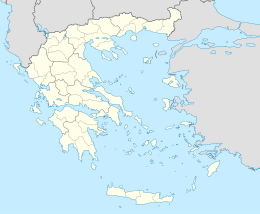geo.wikisort.org - Island
Atalanti (Greek: Αταλάντη) or Atalantonisi (Αταλαντονήσι) or Talandonísi (Ταλαντονήσι) is a small uninhabited island in the North Euboean Gulf, about 600 m off the coast near the town Atalanti, Phthiotis, Greece. There are several small islets next to Atalanti island, including the islet of Agios Nikolaos.
Native name: Αταλαντονήσι | |
|---|---|
 | |
 Atalanti | |
| Geography | |
| Coordinates | 38.675°N 23.096°E |
| Highest elevation | 129 m (423 ft) |
| Administration | |
Greece | |
| Region | Central Greece |
| Regional unit | Phthiotis |
| Demographics | |
| Population | 0 (2011) |

Anciently, the island was known as Atalanta or Atalante (Ancient Greek: Ἀταλάντη). It was noted by ancient geographers and historians as a small island off Locris, in the Opuntian Gulf, said to have been torn asunder from the mainland by an earthquake. In the first year of the Peloponnesian War this previously uninhabited island was fortified by the Athenians to prevent Locrian pirates attacking Euboea.[1] In the sixth year of the war a part of the Athenian works was destroyed by the sea, with half the ships on the beach destroyed. Thucydides reports that following an earthquake, the sea receded from the shore before returning in a huge wave.[2] Citing similar events at Peparethus and Orobiae, he suggests that earthquakes and such "sea events" are linked—we now know that such tsunami are in fact caused by earthquakes. In 421 BCE, the Peace of Nicias returned Atalanta to Sparta.[3] Aside from Thucydides, the island is noted by Strabo,[4] Diodorus,[5] Pausanias,[6] Livy,[7] Pliny the Elder,[8] Seneca,[9] and Stephanus of Byzantium.[10]
References
- Thucydides. History of the Peloponnesian War. Vol. 2.32.
- Thucydides. History of the Peloponnesian War. Vol. 3.89.
- Thucydides. History of the Peloponnesian War. Vol. 5.18.
- Strabo. Geographica. Vol. i. p. 61, ix. pp. 395, 425, iii p. 89. Page numbers refer to those of Isaac Casaubon's edition.
- Diodorus Siculus. Bibliotheca historica (Historical Library). Vol. 12.44, 59.
- Pausanias. Description of Greece. Vol. 10.20.3.{{{2}}}.{{{3}}}.
- Livy. Ab Urbe Condita Libri (History of Rome). Vol. 35.37.
- Pliny. Naturalis Historia. Vol. 2.88, 4.12.
- Seneca, Q. N. vi. 24.
- Stephanus of Byzantium. Ethnica. Vol. s. v.
 This article incorporates text from a publication now in the public domain: Smith, William, ed. (1854–1857). "Atalanta". Dictionary of Greek and Roman Geography. London: John Murray.
This article incorporates text from a publication now in the public domain: Smith, William, ed. (1854–1857). "Atalanta". Dictionary of Greek and Roman Geography. London: John Murray.
External links
На других языках
[de] Atalanti (Golf von Atalanti)
Atalanti (Aussprache: [.mw-parser-output .IPA a{text-decoration:none}ataˈlandi], griechisch Αταλάντη (f. sg.)), Atalantonisi (griechisch Αταλαντονήσι (f. sg.)) oder Talantonisi (griechisch Ταλαντονήσι (f. sg.)), ist eine unbewohnte kleine Insel im Golf von Atalanti in Griechenland.- [en] Atalanti Island
[ru] Аталанди (Вориос-Эввоикос)
Атала́нди[1][2][3] (греч. Αταλάντη ή Αταλαντονήσι), также Талантониси (Таландониси[4], Таландонизи[5], Ταλαντονήσι) — необитаемый небольшой остров в Греции, в одноимённой бухте (Опунтском заливе[5]) в заливе Вориос-Эввоикос Эгейского моря, близ берега[5], к востоку от города Аталанди, напротив деревни Скала[el]. Административно относится к сообществу Аталанди в общине Локри в периферийной единице Фтиотида в периферии Центральная Греция.Другой контент может иметь иную лицензию. Перед использованием материалов сайта WikiSort.org внимательно изучите правила лицензирования конкретных элементов наполнения сайта.
WikiSort.org - проект по пересортировке и дополнению контента Википедии